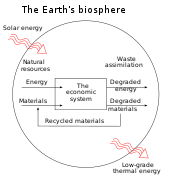| Part of a series on |
| Ecological economics |
|---|
 |
Post-growth is a stance on economic growth concerning the limits-to-growth dilemma[1] — recognition that, on a planet of finite material resources, extractive economies and populations cannot grow infinitely.[2][3][4][5][6][7] The term "post-growth" acknowledges that economic growth can generate beneficial effects up to a point, but beyond that point (cited as $25,000 GDP/capita by Richard Wilkinson and Kate Pickett in their book The Spirit Level) it is necessary to look for other indicators and techniques to increase human wellbeing.[4][5][8]
Post-growth can be distinguished from similar concepts and movements (such as degrowth and steady-state economy) in that it seeks to identify and build on what is already working, rather than focusing on what is not. Post-growth advocates try to encourage, connect and further develop already existing ideas, concepts, technologies, systems, initiatives, and actions. In this way, "post-growth" does not specify the answer to the limits-to-growth challenge, as "steady state economics" and "degrowth" attempt to do, but rather, seeks to understand and address this challenge from an evolving complex systems perspective. With this perspective, post-growth deals with all aspects of self and society (such as psychology, human nature, human evolution, cultures, social systems and economies) and the interrelation of all of these aspects. Accordingly, the post-growth concept also advocates solutions that are appropriate with regards to place, time, resource and cultural factors. Therefore, post-growth initiatives take shape in very different ways under different circumstances.[9]
Post-growth can be considered an asset-based approach to community development — applied not only to community development but across a wide range of categories — in response to limits-to-growth challenges, as it seeks to identify and build on cultural and technological assets to facilitate the emergence of post-growth futures.[9] In his landmark work Prosperity Without Growth (Routledge, 2017), the economist Tim Jackson demonstrates that building a ‘post-growth’ economy is indeed a "precise, definable and meaningful task". Starting from clear first principles, he sets out the dimensions of that task: the nature of enterprise; the quality of our working lives; the structure of investment; and the role of the money supply.[10][11][12]
- ^ Post Growth Institute. "Post Growth Institute homepage". Post Growth Institute.
- ^ Blühdorn, Ingolfur (2017). "Post-capitalism, post-growth, post-consumerism? Eco-political hopes beyond sustainability". Global Discourse. 7 (1): 42–61. doi:10.1080/23269995.2017.1300415.
- ^ Paulson, Lily; Büchs, Milena (2022). "Public acceptance of post-growth: Factors and implications for post-growth strategy". Futures. 143: 103020. doi:10.1016/j.futures.2022.103020.
- ^ a b Daly, Herman (1996). Beyond Growth: the economics of sustainable development. Washington D.C.: Beacon Press. p. 37. ISBN 9780807047088.
- ^ a b Jackson, Tim (2009). Prosperity Without Growth: Economics for a Finite Planet. Sustainable Development Commission. pp. 3–11. ISBN 9781844078943.
- ^ Crownshaw, Timothy; Morgan, Caitlin; Adams, Alison; Sers, Martin; Britto dos Santos, Natália; Damiano, Alice; Gilbert, Laura; Yahya Haage, Gabriel; Horen Greenford, Daniel (2019). "Over the horizon: Exploring the conditions of a post-growth world". The Anthropocene Review. 6 (1–2): 117–141. doi:10.1177/2053019618820350.
- ^ van Woerden, Winne Fleur; van de Pas, Remco; Curtain, Joel (2023). "Post-growth economics: a must for planetary health justice". Globalization and Health. 19 (1): 55. doi:10.1186/s12992-023-00957-2. PMC 10410890.
- ^ Wilkinson, Richard; Kate Pickett (2010). The Spirit Level: Why Equality is Better for Everyone. London: Penguin Books. p. 8. ISBN 9781846140396.
- ^ a b Maclurcan, Donnie (9 July 2012). "Post Growth Futures Are Already Here". Treehugger. Archived from the original on June 20, 2019. Retrieved 2 April 2013.
- ^ "Prosperity Without Growth". Rutledge. Retrieved 11 June 2017.
- ^ "How to kick the growth addiction". Great Transition Initiative. Archived from the original on 2017-04-25. Retrieved 11 June 2017.
- ^ Jackson, Tim (2019). "The Post-growth Challenge: Secular Stagnation, Inequality and the Limits to Growth". Ecological Economics. 156: 236–246. doi:10.1016/j.ecolecon.2018.10.010.
